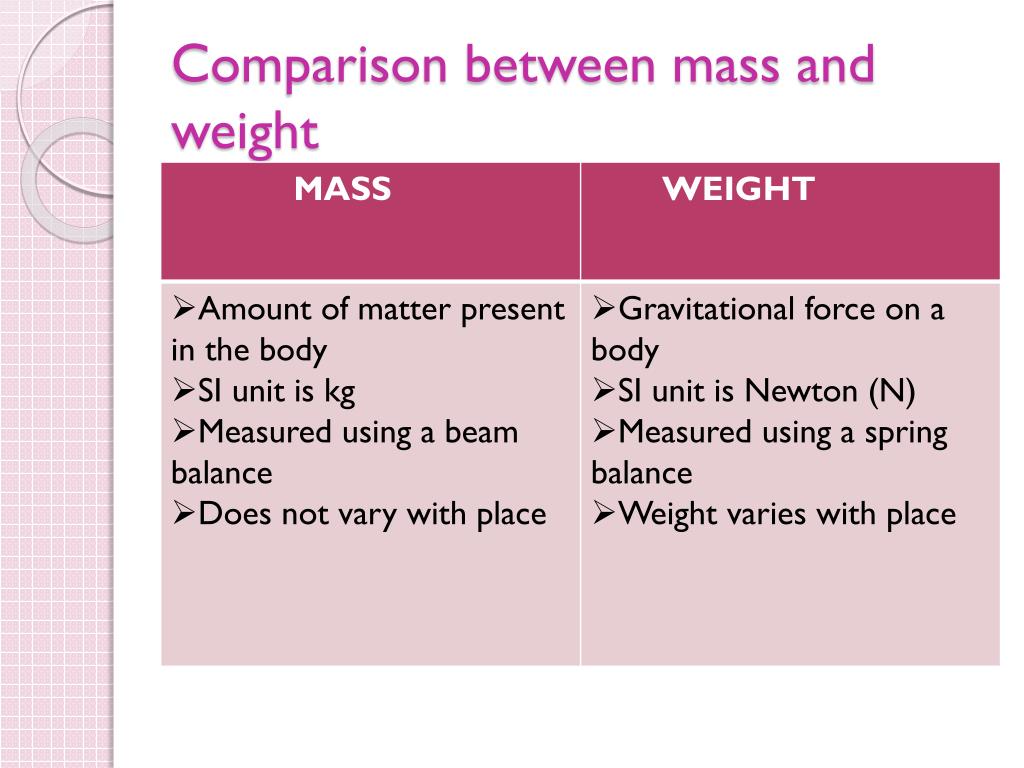A major difference between mass and weight is that your mass is always the same but your weight can change depending on your location

A Major Difference Between Mass and Weight: Your Mass Remains Constant, while Your Weight Fluctuates with Location

Have you ever wondered about the difference between mass and weight? Many people use these terms interchangeably, assuming they mean the same thing. However, there is a significant distinction between the two concepts. While mass refers to the amount of matter an object contains, weight is a measure of the force exerted by gravity on that object.
To understand this difference better, let’s delve deeper into the definition and relevance of both mass and weight.
Mass: A Measure of the Quantity of Matter
Mass is an intrinsic property of matter that remains constant regardless of an object’s location in the universe. It is a measure of the amount of matter an object contains, usually expressed in kilograms (kg) or grams (g). Whether you are on Earth, the Moon, or even in outer space, your mass will remain the same.
For example, let’s consider a hypothetical object weighing 10 kilograms. Regardless of its location, this object will always have a mass of 10 kilograms. This fundamental characteristic of mass makes it an essential concept in physics and other scientific fields.
Weight: The Force Exerted by Gravity
Unlike mass, weight is not a fundamental property of matter but rather a measure of the force exerted by gravity on an object. Weight is proportional to an object’s mass and varies depending on the strength of gravity.

On Earth, the force of gravity is relatively constant, leading to a consistent weight for objects. The standard value for gravity on Earth’s surface is 9.8 meters per second squared (m/s^2). Therefore, a mass of 10 kilograms on Earth will have a weight of approximately 98 newtons.
However, if we were to travel to the Moon, where the gravitational force is approximately one-sixth that of Earth’s, the weight of a 10-kilogram object would diminish to around 16 newtons. Similarly, if we were to venture into deep space, far from any massive celestial bodies, the gravitational force would approach zero, resulting in no weight for the object.
It’s important to highlight that weight is not a fundamental property like mass but rather a force acting on an object due to gravity. This distinction is crucial because weight can vary depending on the location, whereas mass remains constant.
Implications of the Mass vs. Weight Distinction
Understanding the difference between mass and weight has several practical implications, especially when it comes to everyday life and scientific research.
For instance, consider an individual attempting to lose weight. In reality, they are aiming to reduce their mass, not their weight. Mass-loss can be achieved through various methods such as dieting, exercise, or medical interventions. However, since weight is influenced by gravitational force, it may change when the person moves to a different location, even if their mass remains the same.
Additionally, the accurate measurement of mass and weight is crucial in fields such as engineering, aviation, and space sciences. Engineers rely on precise measurements of mass to determine an object’s stability, while aerospace engineers must understand the effects of varying gravity on spacecraft and satellites.
In summary, while mass and weight are related concepts, they possess fundamental differences. Mass represents the quantity of matter an object contains and remains constant regardless of location, whereas weight is the force exerted by gravity on an object and can change depending on the strength of gravitational pull. Understanding this distinction is essential for both scientific understanding and practical applications in various industries.
Share
Related Posts
Quick Links
Legal Stuff

